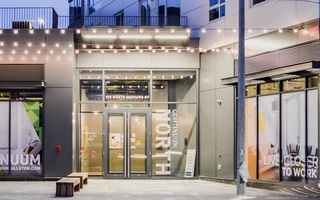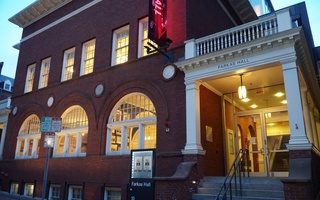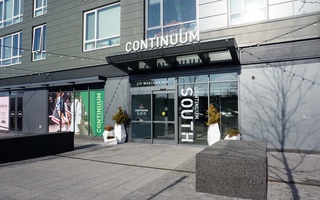
Participants in “Experience Economies 6: Innovate or Die” climb stairs at the Idea Translation Lab @ Cloud Place, an innovation studio in Copley Square, to take the bizarre ARE test.
Richard L. Rundell boarded a shuttle with about 100 others at the Harvard innovation lab. They had just played a memory game involving early 20th century product brands, and they are headed to what is called the “thought incubator” at Continuum, a consulting agency.
The iLab and Continuum were two stops on “Experience Economies 6: Innovate or Die,” a tour on Feb. 18 created by cultural event organizer Experience Economies and hosted and presented by The Lab at Harvard. Innovate or Die led Rundell and the other attendees around Boston area hubs of innovation and highlighted unique projects from artists and scientists. Rundell explains why he traveled from California to participate. “Everyone wants to be innovative,” he says. “It is a small part of business relative to actually getting things done.”
But innovation is a buzzword with little concrete meaning, say MIT architecture doctoral candidate Rebecca K. Uchill and Graduate School of Design student Gavin M. H. Kroeber. The pair co-founded the Experience Economies tour two years ago. “In its original conception, Experience Economies was a kind of social venue with a work-in-progress platform at the center of it—a couple steps beyond potluck plus artwork,” Kroeber says. Each stop on the Innovate or Die tour was meant to examine or critique the concept of innovation from a different angle.
The plan for the night involved shuttling ticketholders to various locations around Boston. The buses left from The Lab, and after attendees worked with doctoral candidate in the history of science Jeremy Blatter at the iLab, two artists presented new angles on innovation at Continuum.
In Catherine McMahon’s audience-participation performance piece, two conference rooms were transformed into a studio set where attendees filled in the blanks, Mad-Libs-style, to a script for what sounded like a public service announcement. In another room, Kelly Sherman, artist and strategist at Continuum, showed posters detailing her collaboration with art teacher Aziza Robinson-Goodnight and the Design Studio for Social Intervention, a Boston social service group. Their project, Sherman explained, aimed to confront violence in the school system by creating a performance piece incorporating students’ definitions of a “fight” and its causes.
At Continuum, Ned L. Whitman ’15—an undergraduate student helping staff a tour comprising mostly graduate-level artists and businesspeople—was bartending. A painter as well as neurobiology buff, he said events like Innovate Or Die should be held on an expanded scale. “An event like this should be done for undergraduates—not only for Harvard, but [for] the Boston community,” he said.
On the way to the Idea Translation Lab @ Cloud Place, attendees were told they were about to take a test. Rations of bananas, for potassium, and AeroShots, for caffeine, were distributed on the bus.
The exam’s creator, artist Mary Walling Blackburn, called the test—the Anhoek Required Examination—a sort of pedagogical experiment. Participants were required to write short essays justifying a range of bizarre topics, from the sexist nature of Mohawk Indians’ term “pretty little canoe” for vagina to the irony of for-inmates-by-inmates clothing lines. The test was designed, Blackburn explained, to force takers into connecting ideas they never would have otherwise and into making absurd arguments sound legitimate. “I wanted to pervert the GRE. Being an artist, it’s my job to create new relationships,” she said.
The night concluded with an after-party held in the Industry Lab, which houses start-up design companies, scientists, and artists alike in a space where interdisciplinary collaboration is encouraged. Past the bullpen and conference room in the front, attendees gathered for pizza in a large brick-walled loft in the rear of the space. Here, artists Jordan W. Long and Emily Hurley presented their work in video and mixed media art, respectively.
Long showed video of his pieces—performance art dealing with physical trauma—which he said represent a personal quest for innovation. “For me, I never really enjoyed performance art, ever. It was the last thing I liked when I looked at art…. When I started thinking about doing performance, I told myself, ‘I really want to change this game. I want to really take this a step forward,’” he says.
Hurley’s works take a nod from how the toy industry and internet tend to endlessly reappropriate old cultural works. As an example, she mentioned the latest Smurfs film. Her prints combine the body parts of different classic cartoon characters or otherwise alter their images—Cinderella’s makeup is smeared; the eyes of Droopy the dog are superimposed on the face of a young girl.
In the loft, individuals with backgrounds in everything from product design to songwriting whispered excitedly about Hurley’s prints. Later, Hurley mentions the event’s spirit of uninhibited connection as her rationale for participating. “I don’t want to just talk to a bunch of artists,” she said. “You should be able to talk to everyone.”
This article has been revised to reflect the following corrections:
CORRECTION: Feb. 29
An earlier version of this article stated that Richard L. Rundell is a software engineer from California. In fact, he is a senior director for a software company and lives in Massachusetts. In addition, the article quoted Rundell on the topic of innovation as having said, “A relatively small part of business is getting things done.” In fact, Rundell said, “It [innovation] is a small part of business relative to actually getting things done.”
CORRECTION: March 2
An earlier version of this article described Continuum as a startup consulting agency. In fact, the company was founded in 1983.
Read more in Arts
The Culinary TheaterRecommended Articles
-
 In Allston, Lucky 42 Offered Dibs on Housing on Harvard Land
In Allston, Lucky 42 Offered Dibs on Housing on Harvard Land -
Trader Joe’s to Open Store in AllstonWith Harvard’s help, grocery chain Trader Joe’s will open a new store in Allston next year at Continuum, a residential and retail complex built on Harvard-owned land.
-
HUBweek Events Highlight Boston-Area InnovationSponsored in part by Harvard, HUBweek is a week-long festival that aims to educate Boston residents about new ideas that companies and individuals in the city are developing
-
 Theater, Dance, and Media Sees Doubled Concentrators
Theater, Dance, and Media Sees Doubled Concentrators -
 Short-Term Rentals May Have Helped Continuum Reach Capacity
Short-Term Rentals May Have Helped Continuum Reach Capacity













